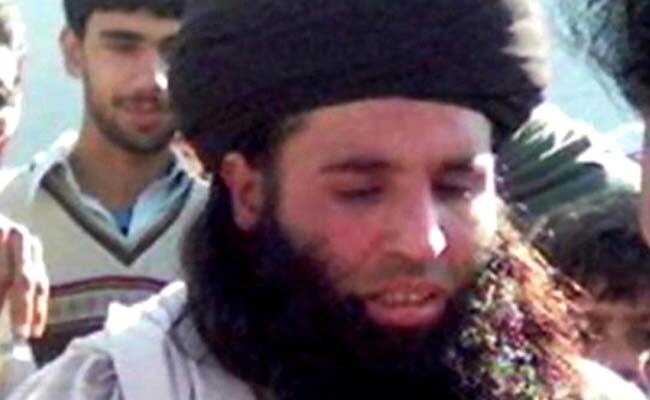
Mullah Fazullah was regarded in Pakistan as a particularly ruthless militant.
Kabul:
A U.S. drone strike killed the head of the Pakistani Taliban in Afghanistan's eastern Konar province, Afghan officials said Friday, eliminating a notorious insurgent commander who had ordered attacks on schoolchildren in Pakistan, including future Nobel Peace Prize winner Malala Yousafzai.
Afghan Defense Ministry spokesman Mohammad Radmanesh said the Pakistani Taliban leader, Mullah Fazlullah, "was killed in the coalition drone strike; this is confirmed."
The U.S. military in Afghanistan confirmed that it carried out a "counterterrorism strike" on Thursday in the border region between Afghanistan and Pakistan that targeted "a senior leader of a designated terrorist organization." The statement did not name Fazlullah or specify that anyone was killed.
A U.S. military spokesman, Lt. Col. Martin O'Donnell, said U.S. and NATO forces continue to adhere to a unilateral, week-long cease-fire declared last week by Afghan President Ashraf Ghani. However, he noted that the cease-fire applies to the Afghan Taliban and "does not include U.S. counterterrorism efforts" against a local branch of the Islamic State, al-Qaida "and other regional and international terrorist groups." The Pakistani Taliban, known locally as Tehrik-e-Taliban, is separate from the Afghan Taliban, although it is now based largely on the Afghan side of the border.
Fazlullah, regarded in Pakistan as a particularly ruthless militant, was widely reviled for ordering a bloody attack on a Pakistani army school in December 2014 in the northwestern city of Peshawar. More than 140 children and their teachers were massacred. Some of the victims were as young as 6 years old.
Two years earlier, Yousafzai, 15 at the time, was gunned down in her native Swat Valley for advocating girls' education. She survived a serious head wound and went on to become the youngest Nobel peace laureate in 2014.
Radmanesh, the Afghan Defense Ministry spokesman, said the strike that killed Fazlullah occurred early Thursday shortly before the Afghan Taliban replied to the government's cease-fire by starting a three-day truce of its own to mark Eid al-Fitr, the Muslim holiday that follows the end of the holy fasting month of Ramadan. He said two other insurgents were killed with Fazlullah.
However, the Associated Press reported, Sakhi Mashwani, a lawmaker from Konar province, said five other insurgents were killed. He said the U.S. drone targeted a vehicle in which Fazlullah and the other militants were riding.
In Yousafzai's home town of Mingora, residents welcomed Fazullah's death, AP reported.
"We witnessed the brutality of the Taliban in Swat when Fazlullah and his men were present here, and we are happy to know that he has gone to hell," Idrees Khan, a member of a local elders peace committee, told the news agency. "People in Swat will feel safer after the killing of Fazlullah
(Except for the headline, this story has not been edited by NDTV staff and is published from a syndicated feed.)
Afghan Defense Ministry spokesman Mohammad Radmanesh said the Pakistani Taliban leader, Mullah Fazlullah, "was killed in the coalition drone strike; this is confirmed."
The U.S. military in Afghanistan confirmed that it carried out a "counterterrorism strike" on Thursday in the border region between Afghanistan and Pakistan that targeted "a senior leader of a designated terrorist organization." The statement did not name Fazlullah or specify that anyone was killed.
A U.S. military spokesman, Lt. Col. Martin O'Donnell, said U.S. and NATO forces continue to adhere to a unilateral, week-long cease-fire declared last week by Afghan President Ashraf Ghani. However, he noted that the cease-fire applies to the Afghan Taliban and "does not include U.S. counterterrorism efforts" against a local branch of the Islamic State, al-Qaida "and other regional and international terrorist groups." The Pakistani Taliban, known locally as Tehrik-e-Taliban, is separate from the Afghan Taliban, although it is now based largely on the Afghan side of the border.
Fazlullah, regarded in Pakistan as a particularly ruthless militant, was widely reviled for ordering a bloody attack on a Pakistani army school in December 2014 in the northwestern city of Peshawar. More than 140 children and their teachers were massacred. Some of the victims were as young as 6 years old.
Two years earlier, Yousafzai, 15 at the time, was gunned down in her native Swat Valley for advocating girls' education. She survived a serious head wound and went on to become the youngest Nobel peace laureate in 2014.
Radmanesh, the Afghan Defense Ministry spokesman, said the strike that killed Fazlullah occurred early Thursday shortly before the Afghan Taliban replied to the government's cease-fire by starting a three-day truce of its own to mark Eid al-Fitr, the Muslim holiday that follows the end of the holy fasting month of Ramadan. He said two other insurgents were killed with Fazlullah.
However, the Associated Press reported, Sakhi Mashwani, a lawmaker from Konar province, said five other insurgents were killed. He said the U.S. drone targeted a vehicle in which Fazlullah and the other militants were riding.
In Yousafzai's home town of Mingora, residents welcomed Fazullah's death, AP reported.
"We witnessed the brutality of the Taliban in Swat when Fazlullah and his men were present here, and we are happy to know that he has gone to hell," Idrees Khan, a member of a local elders peace committee, told the news agency. "People in Swat will feel safer after the killing of Fazlullah
(Except for the headline, this story has not been edited by NDTV staff and is published from a syndicated feed.)
Track Latest News Live on NDTV.com and get news updates from India and around the world

